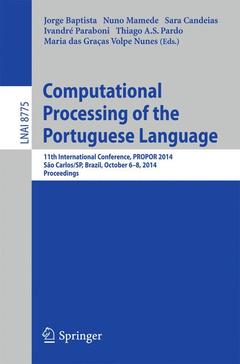Description
Computational Processing of the Portuguese Language, 2014
11th International Conference, PROPOR 2014, Sao Carlos/SP, Brazil, October 6-8, 2014, Proceedings
Lecture Notes in Artificial Intelligence Series
Coordinators: Baptista Jorge, Mamede Nuno, Candeias Sara, Paraboni Ivandré, Pardo Thiago A.S., Volpe Nunes Maria das Gracas
Language: English
Subjects for Computational Processing of the Portuguese Language:
Publication date: 08-2014
300 p. · 15.5x23.5 cm · Paperback
300 p. · 15.5x23.5 cm · Paperback
Description
/li>Contents
/li>
This book constitutes the refereed proceedings of the 11th International Workshop on Computational Processing of the Portuguese Language, PROPOR 2014, held in Sao Carlos, Brazil, in October 2014. The 14 full papers and 19 short papers presented in this volume were carefully reviewed and selected from 63 submissions. The papers are organized in topical sections named: speech language processing and applications; linguistic description, syntax and parsing; ontologies, semantics and lexicography; corpora and language resources and natural language processing, tools and applications.
Speech Language Processing and Applications.- Automatically Recognising European Portuguese Children’s Speech: Pronunciation Patterns Revealed by an Analysis of ASR Errors.- Improving Speech Recognition through Automatic Selection of Age Group – Specific Acoustic Models.- Characterizing Parkinson’s Disease Speech by Acoustic and Phonetic Features.- Rule-Based Algorithms for Automatic Pronunciation of Portuguese Verbal Inflections.- Acoustic Similarity Scores for Keyword Spotting.- Linguistic Description, Syntax and Parsing.- JMorpher: A Finite-State Morphological Parser in Java for Android.- Tagging and Labelling Portuguese Modal Verbs.- Training State-of-the-Art Portuguese POS Taggers without Handcrafted Features.- General Purpose Word Sense Disambiguation Methods for Nouns in Portuguese.- Semi-supervised Parsing of Portuguese.- What We Can Learn from Looking at Profanity.- Ontologies, Semantics and Lexicography.- Extending a Lexicon of Portuguese Nominalizations with Data from Corpora.- Body-Part Nouns and Whole-Part Relations in Portuguese.- Proverb Variation: Experiments on Automatic Detection in Brazilian Portuguese Texts.- Using Cross-Linguistic Knowledge to Build VerbNet-Style Lexicons: Results for a (Brazilian) Portuguese VerbNet.- The Creation of Onto.PT: A Wordnet-Like Lexical Ontology for Portuguese.- Comparing Semantic Relatedness between Word Pairs in Portuguese Using Wikipedia.- On the Utility of Portuguese Term-Based Lexical-Semantic Networks.- Semantic Textual Similarity of Portuguese-Language Texts: An Approach Based on the Semantic Inferentialism Model.- Temporal Aspects of Content Recommendation on a Microblog Corpus.- Development of a Lexical Resource Annotated with Semantic Roles for Portuguese.- Corpora and Language Resources.- brWaC: A WaCky Corpus for Brazilian Portuguese.- DeepBankPT and Companion Portuguese Treebanks in a Multilingual Collection of Treebanks Aligned with the Penn Treebank.- Gramateca: Corpus-Based Grammar ofPortuguese.- Natural Language Processing, Tools and Applications.- Automatic Alignment of News Texts and Their Multi-document Summaries: Comparison among Methods.- Using Rhetorical Structure Theory and Entity Grids to Automatically Evaluate Local Coherence in Texts.- Comparing NERP-CRF with Publicly Available Portuguese Named Entities Recognition Tools.- Integrating Verbal Idioms into an NLP System.- Rolling out Text Categorization for Language Learning Assessment Supported by Language Technology.- Words Temporality for Improving Query Expansion.- An Open Source Tool for Crowd-Sourcing the Manual Annotation of Texts.- Identification of Brazilian Portuguese Causative Verbs through a Weighted Graph Classification Strategy.- Lausanne: A Framework for Collaborative Online NLP Experiments.- Alignment-Based Sentence Position Policy in a News Corpus for Multi-document Summarization.- Identification of Related Brazilian Portuguese Verb Groups Using Overlapping Community Detection.
© 2024 LAVOISIER S.A.S.




